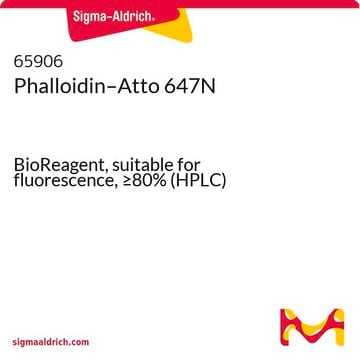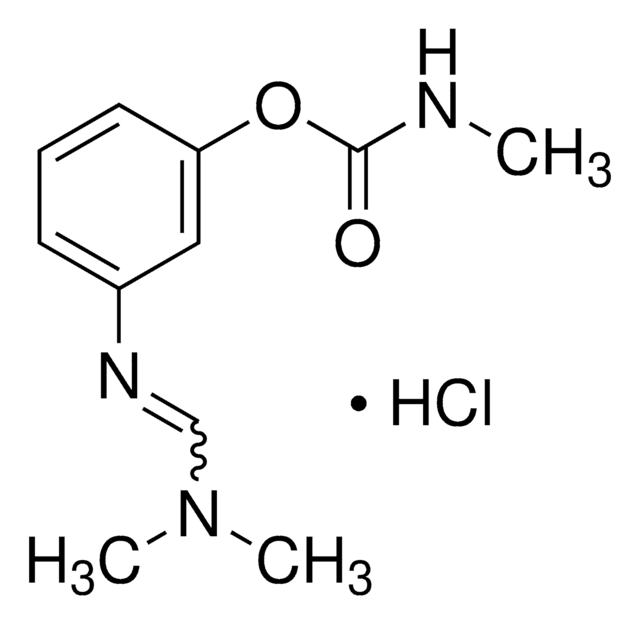Összes fotó(1)
Fontos dokumentumok
55212
Phalloidin–Atto Rho6G
suitable for fluorescence, ≥90% (HPCE)
Bejelentkezésa Szervezeti és Szerződéses árazás megtekintéséhez
Összes fotó(1)
About This Item
UNSPSC kód:
12352116
NACRES:
NA.32
Javasolt termékek
Minőségi szint
Teszt
≥90% (HPCE)
form
solid
molekulatömeg
Mw 1396 g/mol
gyártó/kereskedő neve
ATTO-TEC GmbH
fluoreszcencia
λex 535 nm; λem 560 nm in 0.1 M phosphate pH 7.0
alkalmasság
suitable for fluorescence
tárolási hőmérséklet
−20°C
Általános leírás
Atto Rho6G is a novel fluorescent label that belongs to the class of Rhodamine dyes. It shows a strong absorption, extraordinary high fluorescence quantum yield, high thermal and photostability, and a very little triplet formation. Atto Rho6G is moderately hydrophilic.Phalloidin is a fungal toxin isolated from the poisonous mushroom Amanita phalloides. Its toxicity is attributed to the ability to bind F-actin in liver and muscle cells. As a result of binding phalloidin, actin filaments become strongly stabilized. Phalloidin has been found to bind only to polymeric and oligomeric forms of actin, and not to monomeric actin. The dissociation constant of the actin-phalloidin complex has been determined to be on the order of 3 x 10–8. Phalloidin differs from amanitin in rapidity of action; at high dose levels, death of mice or rats occurs within 1 or 2 hours.
Alkalmazás
Fluorescent conjugates of phalloidin, rhodamine-phalloidin staining reagents, such as Phalloidin–Atto Rho6G are used to label actin filaments for histological applications. Some structural features of phalloidin are required for the binding to actin. However, the side chain of amino acid 7 (g-dihydroxyleucine) is accessible for chemical modifications without appreciable loss of affinity for actin.
Jogi információk
This product is for Research use only. In case of intended commercialization, please contact the IP-holder (ATTO-TEC GmbH, Germany) for licensing.
Analitikai tanúsítványok (COA)
Analitikai tanúsítványok (COA) keresése a termék sarzs-/tételszámának megadásával. A sarzs- és tételszámok a termék címkéjén találhatók, a „Lot” vagy „Batch” szavak után.
Már rendelkezik ezzel a termékkel?
Az Ön által nemrégiben megvásárolt termékekre vonatkozó dokumentumokat a Dokumentumtárban találja.
J E Bowe et al.
Diabetologia, 56(4), 783-791 (2013-01-25)
Glucose plays two distinct roles in regulating insulin secretion from beta cells--an initiatory role, and a permissive role enabling receptor-operated secretagogues to potentiate glucose-induced insulin secretion. The molecular mechanisms underlying the permissive effects of glucose on receptor-operated insulin secretion remain
Models of the collective behavior of proteins in cells: tubulin, actin and motor proteins.
Tuszynski JA, Brown JA, Sept D.
J. Biol. Physics, 29, 401-428 (2003)
Marjolein B M Meddens et al.
Microscopy and microanalysis : the official journal of Microscopy Society of America, Microbeam Analysis Society, Microscopical Society of Canada, 19(1), 180-189 (2013-01-26)
Podosomes are cellular adhesion structures involved in matrix degradation and invasion that comprise an actin core and a ring of cytoskeletal adaptor proteins. They are most often identified by staining with phalloidin, which binds F-actin and therefore visualizes the core.
Magdalena Izdebska et al.
Acta histochemica, 115(5), 487-495 (2013-01-15)
Quantum dots (QDs) are fluorescent nanocrystals whose unique properties are fundamentally different from organic fluorophores. Moreover, their cores display sufficient electron density to be visible under transmission electron microscopy (TEM). Here, we report a technique for phalloidin-based TEM detection of
Ana Vicente-Sánchez et al.
Molecular brain, 6, 42-42 (2013-10-08)
G protein-coupled receptors (GPCRs) are the targets of a large number of drugs currently in therapeutic use. Likewise, the glutamate ionotropic N-methyl-D-aspartate receptor (NMDAR) has been implicated in certain neurological disorders, such as neurodegeration, neuropathic pain and mood disorders, as
Tudóscsoportunk valamennyi kutatási területen rendelkezik tapasztalattal, beleértve az élettudományt, az anyagtudományt, a kémiai szintézist, a kromatográfiát, az analitikát és még sok más területet.
Lépjen kapcsolatba a szaktanácsadással







